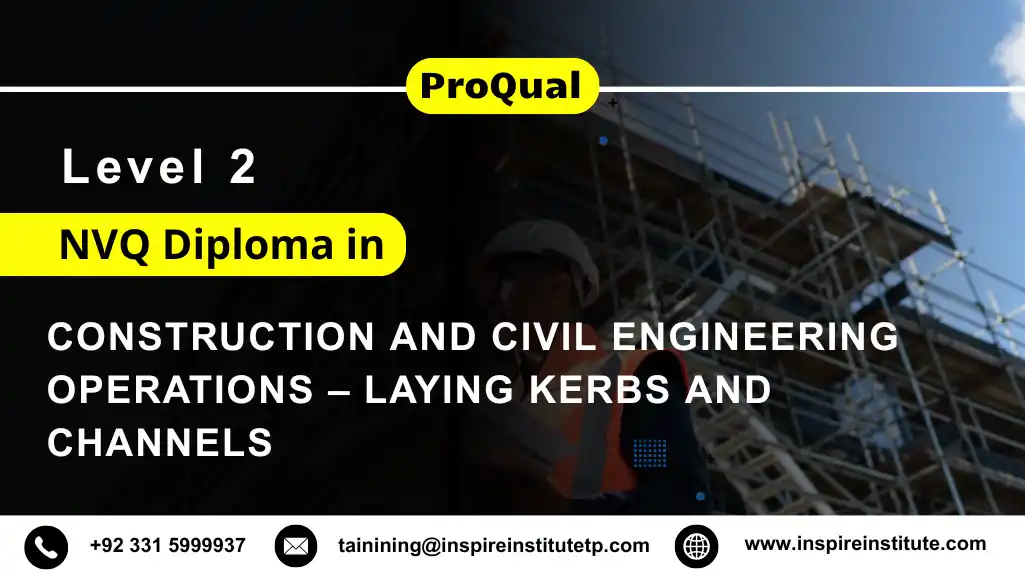ProQual Level 2 NVQ Diploma in Construction and Civil Engineering Operations (Construction)-Laying Kerbs and Channels
The ProQual Level 2 NVQ Diploma in Construction and Civil Engineering Operations – Laying Kerbs and Channels is a nationally recognised qualification designed for individuals working in the construction sector, specifically in the installation of kerbs, channels, and other related surface works. This Ofqual-regulated qualification allows professionals to demonstrate their competence in laying and securing kerbs and channels to industry standards, ensuring compliance with safety regulations and quality requirements.
Ideal for groundworkers, civil engineering operatives, and site workers, this NVQ provides a flexible, work-based assessment process, allowing learners to gain their qualification while continuing their day-to-day roles without the need for exams or classroom learning. Completing this qualification will boost your expertise, enhance your employability, and make you eligible for a CSCS Blue Skilled Worker Card, opening the door to more advanced career opportunities in construction.
Why Choose this Qualification
The ProQual Level 2 NVQ Diploma in Construction and Civil Engineering Operations – Laying Kerbs and Channels offers several key advantages for construction workers and groundworkers looking to advance their careers in civil engineering. Here’s why you should choose this qualification:
- Nationally Recognised and Ofqual-Regulated
This qualification is officially regulated by Ofqual and is widely respected across the UK construction industry, making it a trusted standard for employers and clients. - Practical, Work-Based Assessment
The qualification is based on your real-world work experience, allowing you to demonstrate your skills on-site through evidence-based assessments—no exams or classroom learning required. - Eligibility for CSCS Blue Skilled Worker Card
Successfully completing this NVQ will make you eligible for the CSCS Blue Skilled Worker Card, a key requirement for accessing construction sites across the UK and proving your competence to employers. - Enhance Your Job Prospects
This NVQ validates your expertise in kerb and channel laying, a vital skill in roadworks, landscaping, and infrastructure projects, improving your employability and opening up new career opportunities. - Recognition of Current Experience
If you already perform kerb and channel laying tasks in your role, this qualification formally recognises your existing skills and experience, giving you industry validation without having to return to school. - Increased Site Safety and Compliance
By completing this qualification, you will be trained in industry-standard health, safety, and environmental practices, ensuring safer work environments and compliance with UK construction regulations. - Career Development and Progression
This qualification serves as a solid foundation for further career advancement, providing the skills and recognition necessary to take on more complex roles or progress to higher-level qualifications.
Choosing this qualification is an excellent way to gain formal recognition for your skills, advance your career in construction, and increase your earning potential in the civil engineering field. It offers a flexible and practical approach to professional development while working in your current job.
Course Overview
Ofqual Regulated Qualification
Course Level: Level 3
Average Completion Time:
3-6 Months
Study Units: 6
Evidence & Assignment Based

Inspire Institute of Technologies is Approved Satellite Centre of ProQual
Qualification Structure
The ProQual Level 2 NVQ Diploma in Construction and Civil Engineering Operations (Construction)-Laying Kerbs and Channels, to achieve the qualification candidates must complete all the mandatory units form the following :
Mandatory Units
| Title | Level |
| Installing, maintaining and removing work area protection and safety equipment in the workplace Unit Endorsements: One of the following endorsements required: 1. Protection and safety notices 2. Safety lighting | 2 |
| Laying preformed kerbs and channels in the workplace | 2 |
| Preparing and operating powered units, tools or pedestrian plant, machinery or equipment in the workplace Unit Endorsements: One of the following endorsements required: 1. Generators 2. Pumps 3. Pedestrian operated plant or machines 4. Mixers 5. Compressors 6. Self-powered tools | 2 |
| Setting out secondary dimensional work control in the workplace Unit Endorsements: Three of the following endorsements required: 1. Lines 2. Levels 3. Depths 4. Areas 5. Heights 6. Angles | 2 |
| Conforming to general health, safety and welfare in the workplace | 1 |
| Conforming to productive working practices in the workplace | 2 |
Who Should Take This Course?
The ProQual Level 2 NVQ Diploma in Construction and Civil Engineering Operations – Laying Kerbs and Channels is designed for individuals working in construction and civil engineering roles, particularly those involved in surface preparation and installation tasks. This course is ideal for:
- Groundworkers and Civil Engineering Labourers
Those involved in laying kerbs, channels, and associated surface works in road construction, landscaping, and drainage systems. - Paving and Drainage Operatives
Workers who focus on setting kerbs, channels, and edging materials, and wish to formalise and validate their experience. - Construction Site Operatives
Individuals working on construction sites who want to gain a recognised qualification and enhance their job prospects. - Workers Seeking a CSCS Blue Skilled Worker Card
Anyone looking to gain a CSCS Blue Card to meet construction site requirements and improve employability. - Professionals Looking to Build or Advance Their Careers
Those already in the industry who want to gain formal recognition of their skills and progress to higher-level roles or qualifications.
This qualification is particularly suited for workers with experience in kerb and channel laying tasks, who wish to formalise their expertise and demonstrate their competence to employers.
Course Benefits
The ProQual Level 2 NVQ Diploma in Laying Kerbs and Channels offers a variety of advantages for construction professionals. Here’s why this qualification is a smart investment for your career:
- Nationally Recognised Qualification
Gain an Ofqual-regulated qualification that is widely acknowledged across the UK construction industry. This boosts your professional credibility and enhances your job prospects. - Work-Based, Practical Assessment
This qualification is based on competency-based assessments, meaning you can demonstrate your skills and knowledge directly in your work environment. There are no exams or classroom learning required, making it ideal for busy professionals. - Eligibility for CSCS Blue Skilled Worker Card
Completing this NVQ makes you eligible to apply for the CSCS Blue Skilled Worker Card, which is essential for working on most UK construction sites and is highly regarded by employers. - Recognition of Existing Skills and Experience
If you already have experience in laying kerbs and channels, this qualification formally recognises and validates your skills, giving you industry-wide certification without needing to take time off work. - Improved Job Opportunities
Having this NVQ opens up more job opportunities within the construction and civil engineering sectors, allowing you to apply for roles with greater responsibility and higher pay. - Enhanced Health, Safety, and Compliance Knowledge
This qualification includes training in the latest health, safety, and environmental practices, ensuring you work in compliance with UK regulations and maintain a safe working environment. - Supports Career Progression
The qualification lays the foundation for further career development, allowing you to pursue advanced qualifications or move into supervisory roles within the construction industry. - No Classroom Time or Exams
The flexible, work-based assessment structure means you don’t need to attend a classroom or sit exams. You can learn and gain your qualification while continuing your work on-site.
The ProQual Level 2 NVQ Diploma in Laying Kerbs and Channels is a great way to gain industry recognition for your skills, increase your employability, and take the next step in your construction career—all while working in your current job.
Eligibility Criteria
To enrol in the ProQual Level 2 NVQ Diploma in Construction and Civil Engineering Operations – Laying Kerbs and Channels, candidates must meet the following requirements:
Currently Employed in a Relevant Role
You must be working in a construction or civil engineering role that involves laying kerbs, channels, and related surface works.
Minimum Age Requirement
Learners must be at least 16 years of age at the time of registration.
Hands-On Industry Experience
You should have practical experience in kerb and channel installation, enabling you to gather work-based evidence to demonstrate your competence.
Ability to Provide Work-Based Evidence
You must be able to provide real-life evidence from your job, such as photos, work records, witness statements, or supervisor feedback.
Basic Literacy and Communication Skills
While there are no formal academic entry requirements, basic reading, writing, and communication skills are needed to complete the portfolio and engage in assessments.
The Qualification Process
The ProQual Level 2 NVQ Diploma in Construction and Civil Engineering Operations – Laying Kerbs and Channels is assessed entirely through practical, work-based evidence. The process is flexible and designed to fit around your current job. Here’s how it works:
1. Initial Assessment and Enrolment
Your journey begins with an initial skills review to confirm that your job role matches the qualification requirements. Once confirmed, you’ll be enrolled and assigned a qualified NVQ assessor.
2. Induction and Planning
You’ll receive a full induction to understand the structure of the qualification, what evidence is needed, and how assessments will be carried out. A personalised assessment plan will be created to suit your work schedule and responsibilities.
3. Evidence Gathering (On-Site Assessment)
You will start collecting evidence of your competence from your day-to-day work. This may include:
- Photos or videos of tasks completed
- Method statements or job sheets
- Witness testimonies from supervisors
- Health and safety documentation
- Recorded professional discussions or reflective accounts
4. Assessor Guidance and Support
Your assessor will provide ongoing support, feedback, and guidance. They may also carry out workplace observations or virtual assessments to verify your skills.
5. Portfolio Compilation
All evidence is compiled into a structured portfolio, showing that you meet the standards required across all relevant units of the qualification.
6. Final Assessment and Verification
Once your portfolio is complete, it undergoes a final review by your assessor and an internal verifier to ensure all criteria have been met to the required standard.
7. Certification
After successful verification, you will be awarded the ProQual Level 2 NVQ Diploma in Laying Kerbs and Channels, a nationally recognised qualification regulated by Ofqual.






